|
|
|
Sort Order |
|
|
|
Items / Page
|
|
|
|
|
|
|
| Srl | Item |
| 1 |
ID:
130988
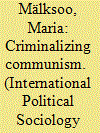

|
|
|
|
|
| Publication |
2014.
|
| Summary/Abstract |
The Eastern enlargement of the European Union has intensified calls for the reconstruction of a common European remembrance of the continent's multiple totalitarian legacies. Various political initiatives to condemn, along with counter-attempts to re-legitimize, the legacy of communism have emerged at the pan-European level. Each aspires to leave an imprint on the symbolic moral order and the legal regime of the broader European community. This article builds a conceptual framework for understanding the contestation of political and juridical regulation of the transnational remembrance of totalitarian communist regimes in Europe. Critically engaging the concept of cosmopolitanization of memory, it is argued that mnemonic identity in Europe is being transformed via new claims on "European memory." These claims are being made by various East European actors seeking recognition of the region's particular historical legacies as part of the pan-European normative verdict on twentieth-century totalitarianisms.
|
|
|
|
|
|
|
|
|
|
|
|
|
|
|
|
| 2 |
ID:
061769
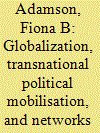

|
|
|
|
|
| Publication |
Apr 2005.
|
| Summary/Abstract |
This article examines how globalisation processes provide new incentives and opportunities for non-state political entrepreneurs to build transnational political movements. Drawing on the literatures on non-violent social movements and transnational networks, the article examines terrorism and political violence as components of the ‘repertoires of contention’ used by radical transnational groups seeking political change. Examples from both the pre- and post-9/11 periods are provided, and the implications for traditional models of state security are discussed. The article concludes by contending that the combination of increased levels of globalisation and the emergence of new networks of violence is creating a fundamental shift in the international security environment, in which the distinction between internal and external security threats is increasingly blurred. While state security strategies are reflecting these changes, less attention has been paid to the political implications of these changes. New security responses need to also be matched by new sets of political strategies at the global level.
1 Versions of this article were presented at the Workshop ‘Globalisation and Security’, Olin Institute for Strategic Studies, Harvard University, Cambridge, MA, 14–16 November 2003 and at the 45th Annual Convention of the International Studies Association, Montreal, 17-20 March 2004. The author wishes to thank Nora Bensahel, Jonathan Kirshner, Sean Lynn-Jones, participants at the Olin workshop and two anonymous reviewers for their helpful comments.
|
|
|
|
|
|
|
|
|
|
|
|
|
|
|
|
| 3 |
ID:
159603


|
|
|
|
|
| Summary/Abstract |
When the Transatlantic Trade and Investment Partnership (TTIP) negotiations were underway, its politics were distinctively transnational. Numerous alliances between European and American industry associations advocated an ambitious agreement to mitigate the effects of conflicting rules. Some civic interest groups also closely cooperated to shape the agreement, while a broad, loose transatlantic coalition of civic interest groups opposed it. The extent of transnationalism in TTIP was greater than what had come before in the transatlantic relationship and what is evident in contemporaneous analogous trade negotiations. This article argues that while the salience of a trade negotiation affects whether societal actors mobilize, it is not sufficient to prompt transnational cooperation. Rather transnational cooperation stems primarily from what the actors are seeking to achieve and whether they have a motive and opportunity to work together. By clarifying the conditions under which transnational cooperation is more likely, this article informs the emerging literature on the new politics of trade. By making the case that the motives to mobilize and cooperate require distinct analysis, it contributes to the literature on transnationalism.
|
|
|
|
|
|
|
|
|
|
|
|
|
|
|
|
| 4 |
ID:
179804


|
|
|
|
|
| Summary/Abstract |
Arabian Peninsula politics are in a period of enormous transformation. In the context of a new generation of rulers seeking legitimacy through ambitious foreign policy regimes, shifting relations with Iran, the 2017–2021 Qatar crisis, and ongoing conflict in Yemen, this article introduces the July 2021 special section of International Affairs, which examines how the Arab states of the Gulf are adapting to these new realities. Questions addressed include: how have transnational identities been manipulated by states during regional disputes? How have oil and gas revenues been redirected to build up religious soft power and enhance state branding efforts? In an increasingly authoritarian world, how has transnational repression interacted with politicized diasporas to impact opposition mobilization? And, how do disputes over airspace help us understand the process of sovereignty-building in the modern Middle East? In pursuing these questions, the special section challenges the particularism still apparent in many analyses of the Gulf region, and seeks to bridge International Relations with fieldwork-based Gulf studies. The research presented in the section highlights new findings within contemporary research on the Gulf that will be of interest both to policy-makers and others seeking to understand the long-term sustainability and balance of power in this critical region.
|
|
|
|
|
|
|
|
|
|
|
|
|
|
|
|
| 5 |
ID:
131712
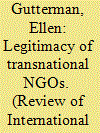

|
|
|
|
|
| Publication |
2014.
|
| Summary/Abstract |
This article develops theoretical insights concerning the legitimacy of non-profit Transnational Non-Governmental Organisations (TNGOs) in global governance. The research compares the advocacy initiatives of Transparency International (TI), the leading TNGO in the international regime of anti-corruption, in Germany and France during the 1990s. The main argument is that the legitimacy of TNGOs is a relational concept: it is granted or denied in a relationship between at least two parties, in which actor attributes play a role but are not decisive. Only such a relational conception can explain why a given TNGO is granted legitimacy in one context and denied it in another. In addition, legitimacy matters. Although insufficient on its own, legitimacy is a necessary condition for effective advocacy, which TNGOs can generate endogenously. To the extent that the legitimacy of TNGOs depends on their acceptance by dominant groups and powerful decision-makers, therefore, 'legitimate' TNGOs may function to sustain rather than challenge the structures of power which condition global outcomes in ways that are often contrary to the goals of equality, fairness, and justice. Thus to assess the impact of TNGOs in global governance, one must examine which TNGOs have been granted (or denied) legitimacy and influence, and why.
|
|
|
|
|
|
|
|
|
|
|
|
|
|
|
|
| 6 |
ID:
086461


|
|
|
|
|
| Publication |
2008.
|
| Summary/Abstract |
Although Margaret Keck and Kathryn Sikkink formulated the concept of a transnational advocacy network (TAN) as a tight-knit community of transnational nongovernmental individuals with shared beliefs and identities, they did not go on to trace the dynamics of the development of such a network. This paper claims that "shared values" is an insufficient explanation for network-building. It further expands on the analytical framework for the development of a TAN by discussing the following three main themes: (1) the political opportunity that catalyzes the emergence of the activists; (2) the network "glue" that facilitates cohesion and closeness in the TAN; and (3) the network organization that defines the participation and problems related to role distribution with respect to the activists in the TAN. This study examines the case of the anti-Yasukuni TAN comprising activists from Taiwan, South Korea, and Japan, and finds that the TAN was transformed in terms of its function and strategy as activists of different national origins joined it. From the evidence gleaned from structured interviews, it was found that activists from Taiwan instilled the TAN with a revolutionary character that facilitated the mobilization of wider social support. Ambitious activists from South Korea then added a greater international dimension to the TAN. Although the groups from Taiwan and South Korea tended to accelerate the development of the TAN and diversify it, the Japanese group reminded the developing TAN of its original target. Thus, a TAN is a far more complex entity with a mixture of multinational and cultural attributes rather than a simple and steady network formed by transnational actors with shared beliefs, as Keck and Sikkink have posited.
|
|
|
|
|
|
|
|
|
|
|
|
|
|
|
|
| 7 |
ID:
174944


|
|
|
|
|
| Summary/Abstract |
A riveting narrative depicting the entrapment of an American woman and her daughter in Iran, Not without My Daughter may still be the most well-known depiction of post-revolutionary Iran in the United States. According to the 1987 book memoir and the 1991 movie by the same name, Michigan homemaker Betty Mahmoody agreed to visit Iran in 1984 for a short vacation on the assurances of her doctor husband, a native of Iran whom she had married in the United States. Once in the Islamic Republic, however, her husband forced her and their four-year-old daughter Mahtob to stay in the country. She was allowed to get a divorce and leave; however, Iranian custody laws meant she would have had to leave Mahtob behind. She refused: not without my daughter. After a year and a half of intense surveillance and physical and mental abuse at the hands of Dr. Mahmoody and his close relatives, Betty and Mahtob managed to escape across the mountains into Turkey with the help of smugglers. Finding refuge in the U.S. embassy in Ankara, the two flew back to the United States, where Betty Mahmoody became a household name, giving TV interviews, publishing her best-selling memoir, and offering her expertise to the State Department as a consultant.
|
|
|
|
|
|
|
|
|
|
|
|
|
|
|
|
| 8 |
ID:
064816
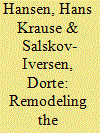

|
|
|
|
|
| Publication |
Apr-Jun 2005.
|
|
|
|
|
|
|
|
|
|
|
|
|
|
|
|
| 9 |
ID:
131561
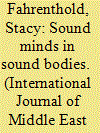

|
|
|
|
|
| Publication |
2014.
|
| Summary/Abstract |
Established in 1920, al-Nadi al-Homsi in São Paulo, Brazil was a young men's club devoted to Syrian patriotic activism and culture in the American mahjar (diaspora). Founded by a transnational network of intellectuals from Homs, the fraternity committed itself to what it saw as a crucial aspect of Syrian national independence under Amir Faysal: the development of a political middle class and a masculine patriotic culture. Al-Nadi al-Homsi directed this project at Syrian youth, opening orphanages, libraries, and schools in both Syria and in Brazil. In these spaces, men and boys congregated to celebrate a polite male culture centered on secular philanthropy, popular education, and corporeal discipline through sports. This article argues that during the 1920s and 1930s, al-Nadi al-Homsi's politics of benevolence was part of a larger social milieu that drew analogies between strong Syrian minds and bodies and a sovereign, independent Syrian homeland.
|
|
|
|
|
|
|
|
|
|
|
|
|
|
|
|
| 10 |
ID:
096548


|
|
|
|
|
| Publication |
2010.
|
| Summary/Abstract |
Political dynamics and outcomes around the globe have been transformed by globalization, new patterns of human mobility, and the development of innovative transnational social networks. These new political processes are rooted in communities and networks that are not restricted by geographic location. Although politics has been delinked from territory in this way with regard to processes and actors, this does not mean that transnational politics focuses exclusively on universal issues or global approaches to social justice. Rather much of the new transnational politics is intensely focused on specific locations, identities, and issues (for example, "globalized" neighborhood associations, ethnicities, patrimonialism). Transnational politics also includes new conceptions and practices of citizenship and accountability (for example, legislative seats reserved for expatriate labor migrants) as the body politic becomes increasing mobile, political affinities delinked from geographic proximity, and critical constituencies reside outside of the territory of the state. This article outlines a new approach to investigating the actors and processes at the heart of contemporary transnational politics, with a particular focus on the ways in which diasporas are strategically constructed and mobilized to advance political goals through the use of salient symbols, identity frames, and social networks.
|
|
|
|
|
|
|
|
|
|
|
|
|
|
|
|
| 11 |
ID:
130909
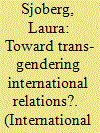

|
|
|
|
|
| Publication |
2012.
|
| Summary/Abstract |
This article engages with trans-theorizing to show how International Relations (IR) is currently blind to gender diversity, and the conceptual contributions trans-theorizing could make. To do so, it asks what insights trans-theorizing might provide for the study of global politics generally, and for feminist theorizing about gender in global politics specifically. After briefly introducing the terminology of trans-theorizing, the article addresses the potential for (and potential hazards of) an alliance between trans-theorizing and feminist theorizing in IR. The article then discusses several potential contributions of trans-theorizing-including hyper- and in-visibility, liminality, crossing, and disidentification-which provide explanatory leverage for IR. The article concludes with some suggestions for further collaboration between trans-theorizing and (feminist) IR to deepen and widen IR's work on gender specifically, and global politics generally.
|
|
|
|
|
|
|
|
|
|
|
|
|
|
|
|
| 12 |
ID:
152715
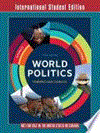

|
|
|
|
|
| Edition |
3rd ed.
|
| Publication |
New York, W W Norton and Company, 2010.
|
| Description |
xxxiii, 664p.pbk
|
| Standard Number |
9780393938098
|
|
|
|
|
|
|
|
|
|
|
|
Copies: C:1/I:0,R:0,Q:0
Circulation
| Accession# | Call# | Current Location | Status | Policy | Location |
| 059028 | 327.1/FRI 059028 | Main | On Shelf | General | |
|
|
|
|
|
|
|
|
|